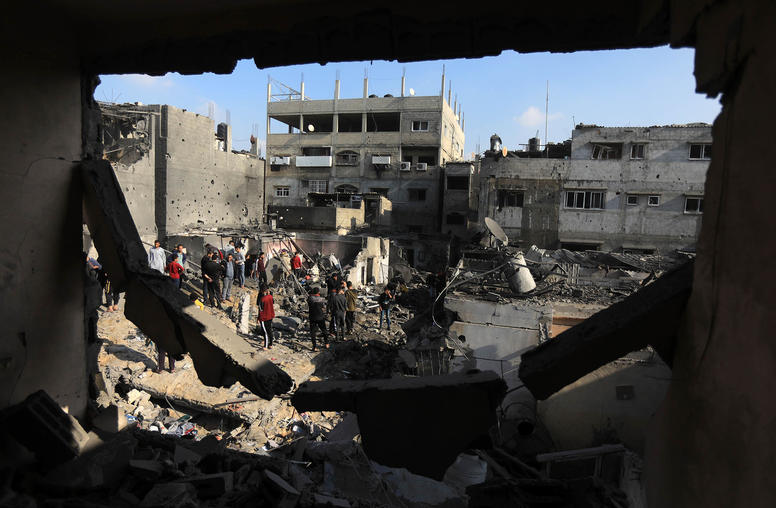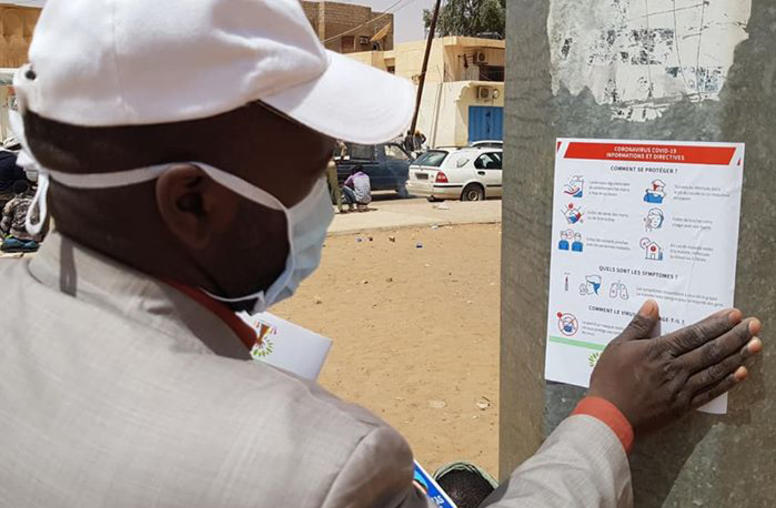Lucy Kurtzer-Ellenbogen on Israel’s Political Turmoil and the Coronavirus Crisis
After three elections, Israel’s political crisis is reportedly coming to an end. Lucy Kurtzer-Ellenbogen explains that the focus has now shifted to the coronavirus pandemic and its impact on the Israeli-Palestinian conflict, saying, “What you do often see in the face of these immediate crises is a lot of banding together and cooperation … the question is how long it holds afterwards.”
On Peace is a weekly podcast sponsored by USIP and Sirius XM POTUS Ch. 124. Each week, USIP experts tackle the latest foreign policy issues from around the world.
Transcript
Tim Farley: Watching the situation develop in Israel, there are several different things happening. Number one, they're trying to form a new government. They seem to have come to an agreement. There are also issues related to coronavirus, which presents a dilemma for tens of thousands of Palestinian laborers who work inside Israel, now cannot travel back and forth. There are also concerns about tracking something you're hearing much about in this country. Uh, the Palestinians, for example, are told to download apps that track phones. That's a story in Haaretz. Trying to make sense of some of the complicated issues there is our next guest, Lucy Kurtzer-Ellenbogen who's director of the Israeli Palestinian conflict program at the U.S. Institute of Peace. The Twitter handle is @USIP. Lucy, welcome back. Thank you for being here today.
Lucy Kurtzer-Ellenbogen: Thank you for having me on, Tim.
Tim Farley: First, on the formation of a government, there seems to be an understanding, a power-sharing arrangement that has been, an agreement that has been reached. Tell us about what we can expect.
Lucy Kurtzer-Ellenbogen: Yes. Well, it's, it's only taken about a year and three elections and we're not there yet, but it does seem, um, that we are close to a power-sharing arrangement between, Prime Minister Benjamin Netanyahu and his main political rival, Benny Gantz. Benny Gantz had been tasked after the most recent election with forming a governing coalition, seemed to have a lot of the cards in his hands to perhaps be able to do so, but a couple of weeks ago did make the decision to enter into to, it seems to be reaching your conclusion, to enter a unity arrangement. What this would be, what he has said is this is necessary right now in the face of this unprecedented, uh, crisis with the corona[virus] pandemic. This would involve as far as we can tell right now, a rotating prime ministership, which, Netanyahu , who would start that rotation and hold that office for the first 18 months.
Tim Farley: On the issue of the coronavirus pandemic, this would seem in some ways that it would unite so many people because let's face it, it is a common enemy. On the other hand, if you look in Israel, there are reports that there are specific ultra-Orthodox communities that are being hit disproportionately. In addition to that, there are some of the concerns about Palestinians who have to go across the border to work at, tell us how it is playing out right now in that country and in that region.
Lucy Kurtzer-Ellenbogen: Well, look, it is a significant challenge. And again, I think this was partly what prompted this, unity, um, arrangement from Gantz’s perspective, this is a time to not sow further political division in an already politically divided country. As you've mentioned, there are many things at stake. Israel has had a rather serious case relative to other states, in the broader region. I think that now at about nine thousand, maybe higher and now again then that, um, confirmed cases, 60 deaths in Israel though. And I think the West Bank, has had about 240 confirmed cases, not to mention Gaza, which is holding it, right now has been holding for a few days at 12 confirmed cases.
As you know, this is already, a conflict environment with complex arrangements between different communities within Israeli society, let alone between the Israelis and Palestinians. And as you know, there's a lot of interdependence between the Israeli and Palestinian economies. You've had a lot of Palestinians working, in Israel and that has become concerned. Israel is about to enter within the next few hours a full shutdown in advance of the Passover holiday. There is some expectation that there'll be Palestinian laborers returning to the West Bank who’ve been in Israel, during this holiday and that's become, um, a significant concern for the West Bank authorities who are worried about more confirmed cases, um, coming back in.
Tim Farley: What happens, I mean, we've seen play out in this country, what the Congress has to deal with and the president has to deal with, with the economy. What about the economic ramifications in the region? What happens down the road when people, for example, there are anecdotes of people who work as laborers on the Israeli side go back home, Palestinian side, they can't work, they're quarantined, they're not making any money. And one wonders what happens to stir that economic drink in, in Israel. Lucy Kurtzer-Ellenbogen: Absolutely. And this is a significant concern. Of course, this is coming at a time, this has been particularly on the Palestinian economy, has traditionally over the last number of years been maligned on international donor community. And of course the international community right now has its own hands full dealing with the pandemic. This, this is by nature of a pandemic. It is hitting everyone and everywhere hard and if it hasn't hit certain places yet, the expectation is it is coming. And this is a course, the major concern, I said Gaza before, I think, Israelis and Palestinians, let alone the neighboring region and neighbors, such as Egypt, are really holding their breath.
Cause I said, that's 12 cases confirmed now. But this is a place that's already in economic devastation, that has weak infrastructure, specifically healthcare infrastructure, poor sanitation conditions, lack of, of necessary equipment to deal if there were a larger outbreak. And of course you're, there's been this cliché almost philosophy is that viruses, pathogens, they don't respect, borders. And so an outbreak of lodge outbreak in Gaza, and if the outbreak becomes more significant in Israel and then the West Bank, we'll have, not just large health implications, obviously more seriously, but severe economic and humanitarian, considerations and concerns for all these actors to deal with.
Tim Farley: To that point about the economic concerns, and this is not directly related to coronavirus, but one of the things we've been watching play out recently is the dropping price of oil has been a battle between Saudi Arabia and Russia on this. And whether or not they're gonna cut supply or not. And as a result of plummeting oil prices affected the economy of Saudi Arabia. And one wonders if that's coupled with some of the economic struggles ahead are raising concerns about the rise of terrorism or rebellions in any of these surrounding countries and if security is becoming increasingly a, an issue.
Lucy Kurtzer-Ellenbogen: Look, absolutely. And this is, this is the challenge when you think of a pandemic like this hitting an already fragile conflict-ridden region. The numbers have been, again, this is all in relative terms, the numbers have been somewhat low, at least those reported numbers right now in some of these Middle Eastern countries. But again, the expectation is these numbers are going to go up everywhere. And we are looking at a broader Middle East region that is, already, mired in fragile conditions, whether it's large populations of refugees, internally displaced people, war, and dire humanitarian situations, in places I've, I've mentioned, Gaza, but places like Yemen, places like Libya. So I think the region is really bracing. I think the question becomes at a time like this, can it lead to some stabilizing measures, some types of cooperation that everybody sees in their own mutual interest, that could actually spur some, some positive effects. Turning back to, Gaza and Israel.
We've seen as an example in the last couple of days that now emerging suggestions that Israel and Hamas have been engaged in, um, and will continue to be engaged in, indirect talks on a prisoner release deal whereby Hamas would release, the bodies of two soldiers and two, currently each civilian prisoners it is holding, in exchange for Israel releasing some Palestinian prisoners. And this is being discussed, as a sort of humanitarian deal in the context of this joint, everybody's confronting of COVID. So again, sometimes in these situations the potential silver lining is that out of these, um, crises you may sometimes see, um, an urgency felt and acted upon for countries that otherwise might not cooperate to try to work together in the face of this crisis.
Tim Farley: And to that broader point, as we wrap this up, I wonder, is there a greater sense of human unity, if you will, or is that also being fractured and borders just becoming more, more brightly drawn, those those lines between cultures and and countries in this region.
Lucy Kurtzer-Ellenbogen: You know, this is, this is going to be one of these situation that plays out over time and we'll see where we end up in the, in the coming months. What you have seen again, to turn to the Israeli Palestinian situation, you've seen a long-term, positive and constructive cooperation between certainly Israelis and Palestinians, the Palestinian authorities in the West Bank around this coronavirus crisis. And what you do often see, and this is something we tested in a simulation we did at USIP a couple of years ago, what you often see in the face of these immediate crises is a lot of banding together and cooperation, in the immediacy of an outbreak like this. The question is how long it holds afterwards. What we found that we spend, we tested, we did a simulation focused on it at the time of the hypothetical cholera outbreak and Gaza. And what we saw is that in the face of an immediate crisis, the actors do actually very well in cooperating to mitigate that immediate danger. But as soon as the immediate danger, subsides, actors have a very hard time, compromising, their interest to get to longer-term solutions. So again, this is something we're going to have to watch, play out over the next few months.
Tim Farley: I do appreciate your joining us, Lucy, thanks so much for being on POTUS today.
Lucy Kurtzer-Ellenbogen: Thank you.
Tim Farley: Lucy Kurtzer-Ellenbogen is director of the Israeli-Palestinian conflict program at the United States Institute of Peace and thoughts on what they're doing there, the power sharing agreement in the government as well as how the relationship is going between Israelis and Palestinians. And of course, beyond those borders, she is tweeting @USIP. That is the Twitter handle: @USIP.




